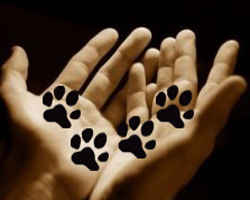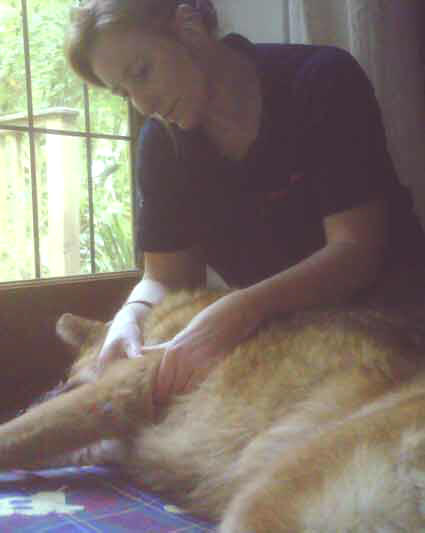| |
Dogs suffer from aches & pains, too...
 How
many of you have embarked on a health and fitness campaign this New Year and are starting to
feel the effects? Aching muscles, stiffness, niggly injuries, signs of arthritis? You may not
be the only one. Most dogs play, jump, run and do some form of physical exercise every day at
varying levels of intensity and they too suffer from similar ailments that impact their general
wellbeing, but they can’t tell you how they feel! Alison Bate has some suggestions. How
many of you have embarked on a health and fitness campaign this New Year and are starting to
feel the effects? Aching muscles, stiffness, niggly injuries, signs of arthritis? You may not
be the only one. Most dogs play, jump, run and do some form of physical exercise every day at
varying levels of intensity and they too suffer from similar ailments that impact their general
wellbeing, but they can’t tell you how they feel! Alison Bate has some suggestions.
We ask a lot more of our agility
dogs by expecting them to perform at high levels of intensity from almost a standing start.
Often they will not show what is wrong with them until they are in pain. Many physical symptoms
such as lameness, stiffness, difficulty getting in or out of the car, or not wanting to move
from their bed may be indicators of underlying problems. Certain behavioural traits may also
indicate a dog is suffering some level of discomfort. With many of these issues, massage can
really help.
The importance of warming up
Because massage
therapy has so many physical and psychological benefits it may be argued that it is in fact an
essential part of a dogs’ healthcare routine such as grooming, feeding and exercise. In the
agility world it is, however, even more important as part of the warm up routine prior to
asking a dog to complete the course. A brisk, stimulating pre-event massage can aid performance
and help prevent muscular and soft tissue injuries. As with human athletes the benefits of
warmed muscles include:-
-
 Increased
speed of contraction and relaxation Increased
speed of contraction and relaxation
- Reduced muscle stiffness
- Greater economy of movement because of lowered viscous
resistance
- Improved oxygen utilisation
- Improved nerve transmission and muscle metabolism
- Increased blood flow through active tissues
We would never
expect a human athlete to compete without warming up. Therefore, we should remember not to ask
our dogs to do this either.
Basic massage benefits
As a non-invasive holistic therapy, canine massage can help with mobility (arthritis,
hip dysplasia), pain relief (lameness, injury, tension), soft tissue injuries (strains or
ruptures), or with post-surgery rehabilitation. It can also aid performance in the show or
agility ring and can really help in the relaxation of nervous or anxious rescue dogs. Massage
is simply an extension of a dogs’ natural social grooming pattern and can be extremely
beneficial in improving its quality of life.
To
learn more about how massage can help your dog, please contact Alison at
4 Paws Therapy. Or ring tel. 01306 627076 or mobile:
07850 055622. Email
4pawstherapy@googlemail.com
About the
author...
Alison Bate,
Dip. Canine Massage Therapy (OCN), Cert. Anatomy & Physiology (IEB), Cert.
Sports Massage is a canine
massage therapist as well as qualified fitness instructor and sports massage therapist. Initially
training in human anatomy, physiology and sports massage and having played sports at various
levels for most of her life, she experienced first hand the positive psychological and
physiological effects of massage on the human body.
Having rescued various dogs, and with an
interest in canine nutrition and holistic therapy, she realised that her existing skills could
be expanded to enable dogs to benefit from the positive effects of massage so she set up
4 Paws Therapy in
Walliswood, Surrey RH5 5RE.
| |
|